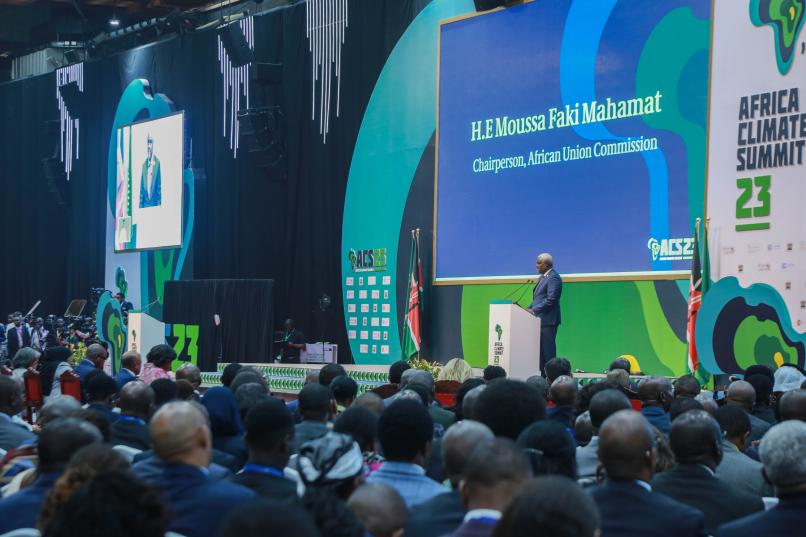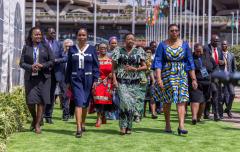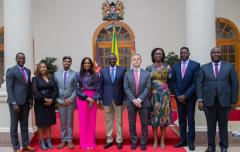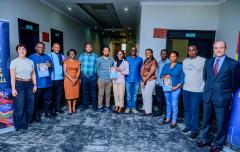Key Outcomes from the first Africa Climate Summit
Urgent and Collaborative Climate Action Required to Achieve Goals of the Nairobi Declaration
From 4-6 September 2023, the African Union and the Government of Kenya co-hosted the inaugural Africa Climate Summit to discuss sustainable solutions to global climate challenges under the theme "Driving Green Growth and Climate Finance Solutions for Africa and the World." The summit culminated in the Nairobi Declaration, an eleven-point call to action proclaiming African States' unified stance on climate action ahead of the 28th United Nations Climate Change Conference (COP28).
Approximately 30,000 delegates participated, including 18 Heads of African States, the Secretary-General of the United Nations António Guterres, and President of the European Union Ursula von der Leyen, with discussions centred on climate action financing, the green growth agenda for Africa, and climate action and economic development.
Sustainable Energy for All (SEforALL) was a technical and content partner to the Africa Climate Summit Secretariat and provided strategic support to the organizing team. We also organized and participated in several sessions over the three days with the goal of engaging the global community around the need to accelerate a just and equitable energy transition.
Several important signs of progress emerged from the Summit, but greater commitment is needed to end energy poverty and fight climate change, both in Africa and globally. Here are our key takeaways and highlights from the Summit.
More financing and reforms needed to unlock Africa’s renewable energy potential
At the Summit, African leaders called for a significant overhaul of the global financial system to facilitate climate action financing. Their demands included improved access to concessional loans, the fulfilment of a 14-year-old promise by developed nations to mobilize USD 100 billion annually for climate adaptation and mitigation, and the establishment of a carbon markets initiative to fund renewable energy infrastructure.
Secretary-General of the United Nations António Guterres voiced support, emphasizing the need for reforming the global financial system to support developing countries in their just and equitable transition towards sustainable development. Africa, with its abundant critical minerals and solar resources, can play a pivotal role in the transition to renewable energy with needed reforms of multilateral lending institutions, which have traditionally viewed climate investments in Africa as risky due to regulatory uncertainties, climate-related threats, and high financing costs, hindering much-needed investments.
To meet the emission reduction targets outlined in the Paris Agreement, Africa requires a substantial USD 2.8 trillion by 2030. Achieving this goal necessitates a ten-fold increase in climate investments, equivalent to nearly 93% of the continent's current GDP. Additionally, African nations often pay up to eight times more for financing from multilateral lending institutions compared to developed countries. This imbalance results in recurring debt crises, leaving little or no resources for climate action.
During the Summit, donor nations and multilateral organizations pledged approximately USD 26 billion for climate investments. Notable commitments included the United Arab Emirates' "non-binding letter of intent" for USD 4.5 billion toward clean energy and USD 450 million for carbon credits. Denmark also announced a USD 232 million pledge for the Green Climate Fund’s second replenishment. The United Kingdom, United States, Canada, Finland, and Germany also pledged several financing and debt swaps for green projects. The Africa Development Bank committed USD 1 billion towards adaptation with a pledge to invest USD 25 billion in climate financing by 2025. Other commitments were made by The Bezos Earth Fund (USD 22.8 million), Climate Asset Management (USD 200 million), Masdar (USD 10 billion) and Camco (USD 100 million).
SEforALL Highlights
As a partner in the Summit, SEforALL supported the Africa Climate Summit Secretariat in its facilitation of the Nairobi Declaration, the common position towards the climate discourse for the continent and commitment to Africa being a green industrial hub that helps achieve global net zero goals by 2050.
We also led the development of the energy transition and renewable energy pillar and provided strategic support for the development of the climate finance, green minerals and manufacturing pillars.
Our delegation to the Summit, led by CEO Damilola Ogunbiyi, organized and supported the First Ladies Event and co-organized several side events. In total, we took part in at least 15 events as key speakers, moderators, or panelists amplifying calls by African countries for concerted, global action to deliver a just and equitable energy transition.
At the Summit, we organized the African First Ladies event and was the platform for the launch of the Coalition for First Ladies on Gender Just Energy Transition in Africa, prioritizing women's role in the energy transition and advocating for energy action in their respective countries, regionally and globally, and, to catalyse key stakeholders to action. It highlighted the crucial role of women in addressing energy transition challenges and advancing sustainability.
Together with partners, we announced the Global e-Cooking Coalition (GeCCo) - a joint initiative of the Global Energy Alliance for People and Planet (GEAPP), Modern Energy Cooking Services (MECS), Sustainable Energy for All (SEforALL) and Energizing Development (EnDev); it is a significant milestone in the global efforts to achieve universal access to clean cooking by 2030.
In partnership with UNEP, Copenhagen Climate Centre, and Signify, we launched a pilot 80-school energy audit. This initiative will highlight the economic and environmental benefits of energy efficiency.
Other notable events organized by SEforALL included Cooling for Africa, Energy Efficiency, Carbon Markets and Clean Cooking.
Less Talk, More Action
The Africa Climate Summit was a significant event that made progress on several key issues, including building consensus on climate action priorities for Africa. However, there are still significant challenges to overcome. While the Summit provided a platform for countries to come together and commit to acting on climate change, it will take a sustained effort to achieve the aspirations of the Nairobi Declaration and the Paris Agreement.
The Summit also highlighted the importance of accountability and transparency in pursuing a just and equitable transition, as well as the need for countries that have contributed the most to climate change taking a lead in financing and implementing climate action. The Summit also highlighted that the benefits of climate action are shared equitably so that no one is left behind.
We intend to carry this momentum forward to the UN General Assembly in New York starting next week and to COP28 in the UAE later this year.
For regular updates on the #NairobiDeclaration #UNGA78 and #COP28UAE, subscribe to our newsletter and follow us on X, Facebook, LinkedIn, Instagram and TikTok. Start here: seforall.org/newsletter





